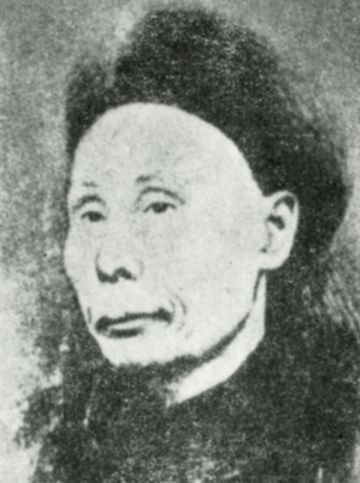Content created: 2014-06-10
File last modified:
More About General Liú Yǒngfú 劉永福 (1837-1917)

Just as Jacques-Louis David managed to remain a government portrait painter before the French Revolution, through the Revolution, and after the dust settled, and just as Sandro Botticelli managed to remain a prominent Italian artist before, during, and after the reign of Savonarola, so in China a martial artist named Liú Yǒngfú 劉永福 (1837–1917) was himself a survivor through untoward and stormy events over a century ago.
- The Tàipíng Period (1850-1871).
- He was a general in the Tàipíng Rebellion (still called the "Heavenly Kingdom of the Great Peace" 太平天國 in Chinese, despite the millions of lives lost over it).
- He fought on behalf of the rebels against the Qīng 清 emperor.
- He lost and quickly surrendered.
- But in the martial arts world he was said to be a high kicker.
- The Qīng Anti-Imperialist Period (1871-1895)
- Having surrendered, he explained that he had never really liked the rebels anyway and he was actually a great patriot and had always loved the emperor.
- Since he was a great patriot who had always loved the emperor, he and his troops were invited to join the Qīng government forces fighting the French in the Chinese protectorate of Vietnam. The French were rambunctiously invading just then, as they did from time to time. His martial arts troops were called the "Black Flag Army." They were all high kickers.
- He lost, what with the French using firearms and all.
- He lost, although he did pick up the sobriquet "Black Flag Liú" 黑旗劉.
- And he still kicked high.
- The crown considered him too dangerous to be allowed anywhere important, so in 1894 he was assigned to defend Formosa against whatever might threaten it.
- When he arrived in Taiwan with the Black Flags, his reputation for kicking preceeded him. In the course of tidying things up for his arrival, the local troops accidentally blew up an munitions depot with 100 of their number who had taken up residence in it. (He made them clean up the mess.)
- Finding the Formosan local commandant to be a jerk, Liú complained to the throne and procured permission to dismiss four officers and behead another four. High kickers do stuff like that.
- The imperial government called him to North China to fight the Japanese, but he told them to quit bugging him and stayed in Taiwan, which grew much better fruit. They withdrew the order.
- The Táiwān Republic Period (1895)
- In April of 1895 the emperor ceded Táiwān to Japan, and the island became part of Japan's Empire of the Rising Sun. (News didn't travel fast, so Chinese military supplies were still arriving in May.)
- Resisting the Japanese takeover, locals declared the founding of a short-lived "Taiwan Republic" with governor Táng Jǐngsōng 唐景崧 as president. (He was inaugurated on May 25 and officialized the design of the republican flag. On June he fled to China. He left the flag, at least.)
- Liú explained that he had never really liked the Chinese emperor very much, and was happy to help the republican rebels.
- As the leader of his very own high-kicking Black Flag Army, plus any local troops who had not blown themselves up the previous year, he resisted the Japanese occupation and engaged in occasional profitable pillaging and looting.
- In September he took political command of the Republic of Taiwan, what with most of the political leadership having fled to China, but he was smart enough not to accept the title of president. As head of state he issued postage stamps.
- In October, having essentially already lost, Black Flag Liú proposed to join the Japanese side if they would provide him appropriate honor, and besides he didn't really have much use for no-good republican types and he had always loved the emperor of Japan.
- Since the Japanese had already won, they declined his surrender offer.
- Nobody said much about his kicking, but I understand that black flags (Taiwanese: ơ-khî-á 黑旗仔) are still a euphemism for split pants in some circles in Táiwān.
- The Qīng Period (1895-1911)
- Liú returned to China, with his fellow split-pants soldiers.
- He explained that he had always loved the Chinese emperor, had been mixed up with the Taiwan rebels only in an effort to restrain them, and had actually been happy to assist in the peaceful transfer of Táiwān to Japan.
- He was proclaimed a great general.
- The Sun Yat-sen Period (1911-1917)
- During the 1911 revolution, as the Qīng Dynasty was overthrown and the Republic of China was being founded, Liú explained that he was a heartfelt republican and had always hated the emperor, whom he found completely disgusting.
- He was therefore pleased to add his Black Flags to something called the Guǎngdōng People's Group 廣東民團.
- He was going to lose.
- But at that moment Sun Yat-sen's honorary military governor (jìmíng tídū 記名提督), WǓ Quánměi 吳全美, invited a martial arts champion named HUÁNG Fēihóng 黃飛鴻 ("Huáng the Flying Goose" 1856-1925) to become the trainer of troops.
- Sun's rebel troops all learned well, and the imperial forces collapsed before Liú had an opportunity to lose to them.
- Sun Yat-sen was made president.
- General Liú Yǒngfú ("Black Flag Liú") was proclaimed a great hero (again) and retired to live a comfortable retirement until his death in 1917 at the age of 80.
Return to top.
